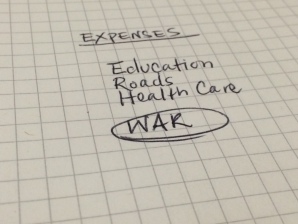War is Expensive
Frontier Economics releases a report on the cost of war in South Sudan.
Oil plays a major role in the revenue for the new nation of South Sudan, and ideally oil money is used to develop the nation. Roads and schools were among the first things promised, and in fact Rebuild South Sudan was hoping to build a partnership with the government to provide teachers for the Jalle Peace School. But instead of schools and roads, the government is financing a war, and war is expensive.
The conflict among government officials has contributed to a decrease in oil production, costing the nation in potential revenue, and has caused existing revenue to be spent on war instead of development. The cost of this war, of course, is deeper than just finances; it costs human life in the present and national stability in the future.
For an organization working towards education and food stability for citizens in South Sudan this key finding in the Frontier report is jarring:
“South Sudan’s spending on security could increase by a further $2.2 billion were the conflict to last another 5 years.* The savings in military spending that would result from resolving the conflict within a year from now would allow South Sudan to meet the internationally recommended target of allocating 20% of spending to education.”
I encourage people to read more about the effects of the South Sudanese civil war in this report by Frontier Economics, a European consulting firm. The report gives a concise background to the conflict as well as recommendations on ending the conflict. Frontier’s holistic evaluation even takes a look at the effects in surrounding countries, like Uganda and Sudan.
I’m particularly moved to action by what Amar Breckenridge, analyst for Frontier Economics, said to South Sudan in Focus:
“Every child, for example, that suffers from malnutrition – that is in and of itself a terrible thing – but it also has significant impacts on his or her own development potential as an adult and the productivity they can bring to bear on the workforce,” said Breckenridge.
We want to see kids in school so this doesn’t happen. We will keep working with the community of Jalle to get our school built so that education and peace are a reality. Thank you for supporting Rebuild South Sudan as we work to empower the people of South Sudan to end the cycles of war and live in stability.
*Based on the conflict starting in December 2013.







